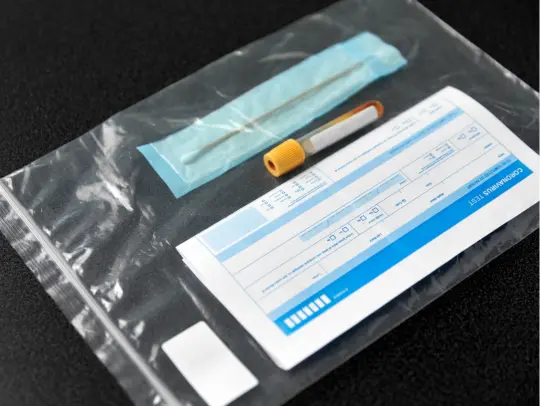
Nurse Practitioner Clarissa - 6 Prostate Supplements Under the Microscope: Do They Actually Work?
6 Prostate Supplements Under the Microscope: Do They Actually Work?
There's been a significant buzz around using dietary supplements as natural remedies for prostate health, particularly for managing an enlarged prostate (benign prostatic hyperplasia or BPH). With so many products making impressive claims about supporting prostate health or even reducing prostate size, it's crucial to examine what scientific evidence actually tells us about these popular supplements. This evidence-based guide separates fact from fiction to help you make informed decisions about your prostate health.
Understanding BPH: What's Behind Your Symptoms
Before exploring specific supplements, it's important to understand the condition they aim to address. Benign prostatic hyperplasia (BPH) is a non-cancerous enlargement of the prostate gland that commonly occurs as men age. This enlargement can cause troublesome urinary symptoms including:
- Frequent urination, especially at night (nocturia)
- Difficulty starting urination or maintaining a steady stream
- Feeling that the bladder never completely empties
- Sudden urges to urinate that are difficult to control
- Straining or pushing to begin urination
These symptoms occur because the enlarged prostate presses against the urethra, restricting urine flow from the bladder. While BPH isn't life-threatening, its impact on quality of life can be significant, disrupting sleep, social activities, and overall wellbeing.
The Science Behind 6 Popular Prostate Supplements
1. Saw Palmetto
Perhaps the most well-known supplement for prostate issues, saw palmetto is derived from the berries of the saw palmetto palm tree (Serenoa repens) and has been used for centuries in traditional medicine.
How It Might Work:
Saw palmetto is believed to work by inhibiting 5-alpha-reductase, the enzyme that converts testosterone to dihydrotestosterone (DHT), a hormone linked to prostate growth. This mechanism is similar to that of prescription medications like finasteride, but potentially with fewer side effects.
What Research Shows:
- Early studies showed promising results comparable to some prescription medications
- However, a rigorous 2006 study in the New England Journal of Medicine found no significant difference between saw palmetto and placebo
- A follow-up 2011 study using escalating doses still showed no benefit over placebo
- Some men report subjective improvements despite inconsistent clinical evidence
The Verdict:
While saw palmetto appears safe for most men, the evidence for its effectiveness in shrinking the prostate or significantly improving urinary symptoms is inconsistent. If considering saw palmetto, look for standardized extracts containing 85-95% fatty acids and sterols, and give it 1-2 months to evaluate effects.
2. Beta-sitosterol
Beta-sitosterol is a plant sterol found naturally in fruits, vegetables, nuts, and seeds. It's structurally similar to cholesterol but has different effects in the body, particularly related to inflammation and cellular function.
How It Might Work:
The exact mechanism remains unclear, but beta-sitosterol appears to have anti-inflammatory properties and may improve bladder emptying without necessarily shrinking the prostate itself. It may also influence cholesterol metabolism in prostate tissue.
What Research Shows:
- A review of four randomized controlled trials found that beta-sitosterol improved urinary flow rates and reduced residual urine volume
- Studies typically show improvements in the International Prostate Symptom Score (IPSS)
- Benefits appear to persist for at least 6 months of continuous use
- Effects on actual prostate size are minimal or nonexistent
The Verdict:
Beta-sitosterol shows more consistent evidence for symptom improvement than many other supplements, though it doesn't appear to reduce prostate size. It's generally well-tolerated, with typical studied doses ranging from 60-130mg daily. This supplement has some of the strongest scientific support for improving urinary symptoms associated with BPH.
3. Pygeum Africanum
Pygeum is derived from the bark of the African plum tree (Prunus africana) and has been used in traditional medicine for centuries to treat urinary problems and promote overall prostate health.
How It Might Work:
Pygeum contains various compounds that may reduce inflammation, modulate bladder contractility, and inhibit prostate growth factors. It may also have mild hormonal effects that influence prostate tissue.
What Research Shows:
- A Cochrane review analyzing 18 randomized controlled trials found that men taking pygeum were more than twice as likely to report improved urinary symptoms compared to those taking placebo
- Studies suggest improvements in peak urinary flow, nighttime urination frequency, and residual urine volume
- Most research is relatively short-term (under 6 months), so long-term effects remain less clear
The Verdict:
Pygeum shows moderate evidence for improving urinary symptoms associated with BPH, particularly nocturia (nighttime urination). Typical doses in studies range from 100-200mg daily. Side effects are generally mild but may include digestive disturbances. It appears most effective for managing symptoms rather than actually shrinking the prostate.
4. Stinging Nettle Root
Stinging nettle (Urtica dioica) is a perennial flowering plant whose root has been used medicinally for urinary issues for generations. It's often combined with saw palmetto in prostate formulations.
How It Might Work:
Nettle root contains compounds that may modulate hormones and reduce inflammation through multiple pathways, including interaction with sex hormone binding globulin (SHBG) and inhibition of inflammatory enzymes involved in prostate enlargement.
What Research Shows:
- Studies on nettle root alone are limited, with most research focusing on combinations with saw palmetto or other ingredients
- A six-month study comparing nettle root extract to placebo found significant improvements in urinary flow rate and residual urine
- Combined preparations have shown better results than either herb alone in some studies
The Verdict:
While research is less extensive than for other supplements, stinging nettle root shows potential as a complementary approach to BPH management, particularly when combined with other supplements like saw palmetto. Typical doses range from 120-600mg daily. Most promising when used as part of a comprehensive formula rather than as a standalone treatment.
5. Lycopene
Lycopene is a bright red carotenoid antioxidant found in tomatoes, watermelon, pink grapefruit, and other red fruits and vegetables. It's better known for potential cancer prevention properties but is also studied for BPH.
How It Might Work:
As a powerful antioxidant, lycopene may protect prostate cells from oxidative damage and modulate inflammatory responses. It may also influence growth factor signaling related to prostate cell proliferation and function.
What Research Shows:
- Most research has focused on prostate cancer prevention rather than BPH specifically
- Observational studies suggest that higher dietary lycopene intake is associated with lower risk of prostate enlargement
- Limited intervention studies show modest reductions in PSA levels and improvements in urinary symptoms
The Verdict:
While lycopene likely contributes to overall prostate health, evidence specifically for BPH symptom improvement or prostate shrinkage is preliminary. Consuming lycopene through diet (especially cooked tomato products with healthy fats to enhance absorption) may be more beneficial than supplements. For those who choose supplements, doses of 10-30mg daily have been studied.
6. Zinc
Zinc is an essential trace mineral that plays roles in hundreds of enzymatic reactions in the body. The prostate contains one of the highest concentrations of zinc in the body, which has led to interest in its role in prostate health.
How It Might Work:
Zinc may help regulate inflammatory processes and hormonal balance related to prostate function. Zinc deficiency has been associated with prostate enlargement in some studies, suggesting maintaining adequate levels may be protective.
What Research Shows:
- While zinc deficiency has been associated with increased risk of prostate issues, the evidence for zinc supplementation in already-healthy men is limited
- Some studies suggest that excessive zinc supplementation might actually increase risk of certain prostate conditions
- No compelling clinical trials demonstrate that zinc supplements can shrink the prostate or significantly improve BPH symptoms
The Verdict:
Rather than supplementing, focus on maintaining adequate zinc levels through diet (pumpkin seeds, oysters, beef, crab) unless a deficiency is confirmed. If supplementing, stay within recommended daily allowances (11mg daily for adult men) rather than taking high doses, as excessive zinc may potentially be harmful to prostate health.
Critical Considerations Before Starting Any Supplement
Potential Drug Interactions
Supplements can interact with medications, sometimes with serious consequences:
- Saw palmetto may enhance the effects of anticoagulants and antiplatelet drugs, potentially increasing bleeding risk
- Beta-sitosterol may affect the absorption of certain medications
- Some supplements can interfere with PSA testing, potentially masking changes that should be monitored
Always discuss supplement use with your healthcare provider, especially if you're taking prescription medications for BPH, blood pressure, diabetes, or blood thinners.
Quality and Standardization Issues
The supplement industry isn't regulated as strictly as pharmaceuticals:
- Active ingredient concentrations can vary dramatically between products and even between batches
- Some supplements may contain contaminants or undeclared ingredients
- The form of the supplement (extract vs. whole herb, for example) can significantly affect potency
Look for products from reputable manufacturers that undergo third-party testing (USP, NSF, or ConsumerLab verified) and provide standardized amounts of active compounds.
Medical Supervision Is Essential
Self-diagnosing and self-treating prostate conditions can be risky:
- Symptoms of BPH can resemble those of prostate cancer, urinary tract infections, or other conditions requiring different treatment
- What feels like mild BPH might actually be more severe than you realize, with potential complications if left untreated
- Regular prostate exams and appropriate screening remain essential regardless of supplement use
Work with a healthcare provider who respects your interest in natural approaches but can also provide proper diagnosis and monitoring.
Beyond Supplements: A Holistic Approach to Prostate Health
While supplements alone may offer modest benefits at best, they can be part of a comprehensive approach to prostate health that includes several key lifestyle factors:
Diet Modifications
- Limit red meat and dairy products
- Increase plant-based foods, especially colorful vegetables
- Consume healthy fats like olive oil and avocados
- Reduce processed foods and added sugars
Regular Exercise
- Aim for 30 minutes of moderate activity most days
- Include both aerobic exercise and strength training
- Consider activities like walking, swimming, or cycling
- Avoid prolonged sitting when possible
Weight Management
- Maintain a healthy BMI
- Focus especially on reducing abdominal fat
- Practice portion control at meals
- Consider intermittent fasting (with medical approval)
Fluid Management
- Stay hydrated throughout the day
- Limit fluid intake in the evening
- Reduce caffeine and alcohol consumption
- Practice "double voiding" to empty bladder more completely
The Bottom Line: What Science Really Tells Us
After reviewing the scientific evidence for prostate supplements, several important conclusions emerge:
- Modest expectations are warranted: While some supplements show promise for symptom management, none consistently demonstrate the ability to significantly shrink the prostate or match the effectiveness of prescription medications.
- Individual responses vary significantly: What works for one man may not work for another. Genetic factors, the specific nature of your BPH, and other health conditions all influence how you might respond to any particular supplement.
- Combination approaches often work best: Rather than relying on a single supplement, a holistic approach that includes dietary changes, exercise, stress management, and potentially multiple complementary supplements may yield better results.
- Medical oversight remains essential: Using supplements doesn't eliminate the need for proper diagnosis, regular check-ups, and prostate cancer screening. Partnership with healthcare providers knowledgeable about both conventional and complementary approaches offers the safest path forward.
The scientific evidence suggests that natural supplements may offer modest benefits for some men with BPH symptoms, particularly in early or mild cases. Their greatest value may be as complementary approaches alongside lifestyle modifications and, when necessary, conventional medical treatment.
Approaching prostate health holistically—considering diet, exercise, stress management, and potentially supplements under medical supervision—likely offers the best path forward. This balanced approach acknowledges both the appeal of natural remedies and the limitations revealed by scientific research.























































































































